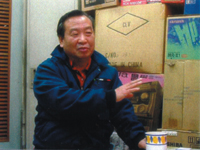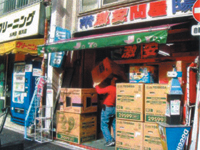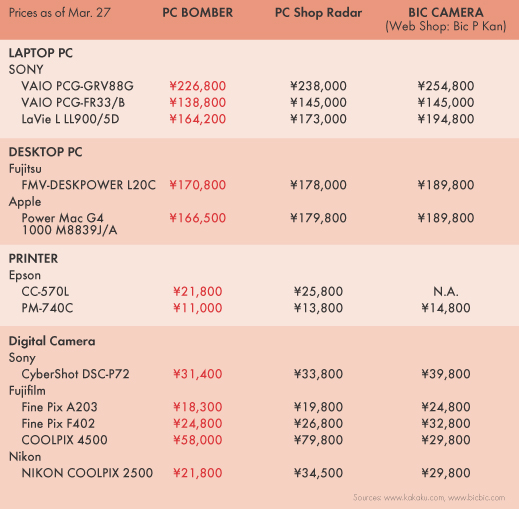Price Slashers
Back to Contents of Issue: May 2003
|
|
|
|
by Ayai Tomisawa |
|
 SAVVY SHOPPERS ARE SURFING the Internet to check the latest prices on electronic goods, then heading off to Okachimachi in Tokyo's Taito ward to buy the best bargains. They're finding unprecedented discounts at the neighborhood's many cash-and-carry wholesalers, whose modus operandi is to squeeze tiny margins out of the products they sell, and sell as much of the stuff as they possibly can. "The more expensive a product is, the bigger discount these stores give us," said Bon Cho, 40, checking digital cameras at a discount store one Saturday evening. Commonly known as battaya, Japanese for "cash-and-carry wholesalers," these discount wholesale and retail shops are scattered around the Okachimachi area of Taito. Battaya are no-frills shops that aggressively cut prices to woo consumers from the more established stores in nearby Akihabara. "About half of our customers A Chiba resident, Bon came to PC Bomber, a battaya store in the area, to bargain for two digital cameras: the COOLPIX 2500 from Nikon and the DiMAGE F100 from Minolta. The DiMAGE F100 was going for JPY36,800 at the shop that evening, while it was being sold for JPY47,800 at big-name retailers such as LaOX The Computer Kan and Bic Camera on the same day. "These are gifts for my friends. I did some research on the Net before coming here," Cho said. There are more than 1,300 of these discount shops nationwide. Their specialties range from electronic appliances to sporting goods such as golf clubs and snowboards, according to Kakaku.com, operator of a popular Web site of the same name where consumers can check the latest prices of all sorts of products listed under neatly categorized bars. "About 80 percent of these battaya stores are located in the Okachimachi area," says Yoshiteru Akita, chief executive officer of Kakaku.com. In nearby Akihabara, brightly lit stores display the latest computer models neatly on shelves. In the battaya of Okachimachi, you're more likely to encounter stacks of large cardboard boxes pouring out into the street. And inside those boxes may be some brand new "kit" with unbeatable prices. In-store displays and flashy advertisements are rare in these battaya. The name "battaya" was coined nearly two decades ago by cash-and-carry wholesalers. At the time, they would purchase inventories from retailers that were collapsing one after the other (described in Japanese as collapsing batta-batta), according to Hideki Obayashi, director of Tokyo Denki Kigu Hanbai Kumiai, a union comprising 33 electronic appliance stores in the Okachimachi area. Obayashi also operates Joyo Denki Shokai, a 36-year-old battaya carrying electronic appliances.
Most battaya shops focused on the wholesale business about 10 years ago, Obayashi says. In the early 1990s, wholesalers started making an entry into the retail business. From the mid-1990s, they started using the Internet as an advertising tool, hoping to boost their sales. "About half of our customers find our store on the Net on sites like Kakaku.com," Obayashi says. Diamonds in the rough
The hottest-selling items are laptop computers and digital cameras, says Kenji Watanabe, president and owner of PC Bomber, which has 40 employees. "Our motto is to offer items cheaper than any store in the nation." Watanabe says the secret to success is to stock the shelves with the most popular items. "The key is no inventory," he says. "Cutting-edge technologies come and go quickly, so products lose value day by day. That's why product prices move everyday." "Computers and electronic goods could be considered fresh grocery, like vegetables and fish," says Kotaro Takahashi, owner of PC Shop Radar, a battaya in Taito ward. "They won't be worth much if they lay on the shelves for more than a week." The battaya set their profit margins at between 2 and 4 percent on average, which means a profit of just a few hundred yen on many products. "Our business model is based on low margins and high volumes," Watanabe says. PC Bomber, which sells about JPY8 million worth of goods on the average weekday and JPY15 million a day on the weekend at its store, also cashes in on Internet sales. Online sales average about JPY15 million for each weekday but drop off on the weekends because banks are closed (Internet shoppers have to wire the money for their purchases in advance). The key to stable business, Watanabe says, is to maintain good relations with one's partners. These partners include wholesalers, distributors, electronic appliance and computer manufacturers and rival battaya. "I purchase items from rival stores if items are offered at a good deal," he says.
Friendly competition
Do battaya pose a threat to mass-merchandisers? PC Bomber's Watanabe does not seem to think so. "We have our own strategy, just like mass retailers do. They have their loyalty-card systems where customers gain 'points' that can be converted into store coupons. Battaya cannot offer such rewards," he says. "That's why we keep customers happy with always-low prices.'' Traditional retailers say they offer consumers more than the battaya do. "While battaya just sell products at low prices, we satisfy shoppers with services," says Hiroyuki Matsumoto, a salesman in the laptop computer section at LaOX The Computer Kan in Akihabara. "We can dispatch a technical specialist to a customer's home to set up an initial computing environment and to connect a printer with a computer if required." Customers used to purchase computers at mass retailers before computer usage became widespread. But many of them are waking up to the idea that they should do prior research on the Internet, where they can find information for stores offering bargain prices. "Battaya might be a threat to mass merchandisers in terms of the low price tag, but battaya cannot stably supply customers with full-line product selections all the time. Mass merchandisers have their advantages, just as battaya do," says Naoki Tsuchiya, a senior analyst at Commerz Securities. @
|
|
Note: The function "email this page" is currently not supported for this page.








